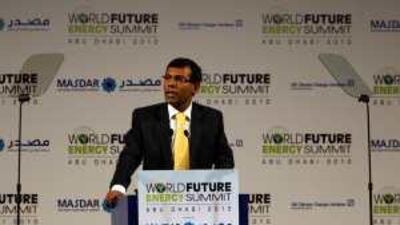ABU DHABI // Gulf oil ministers rose to defend fossil fuels as the bedrock of world energy supplies yesterday even as some clean-energy proponents forecast the arrival of a post-petroleum world. Ministers from Qatar and the UAE told the World Future Energy Summit that clean energy would complement, rather than replace oil and natural gas. Their comments clashed with predictions from others at the conference that continued growth in consumption of fossil fuels and resulting carbon emissions will cause unstoppable climate change, and the world must move quickly to replace the use of oil in transport and heating.
Abdullah al Attiyah, the Qatari minister of energy and deputy premier, forcefully pushed back against what he said was an attempt to "scapegoat" fossil fuels producers. "Why did Copenhagen fail? It's because when you go there you feel that someone is trying to create a scapegoat," he said, referring to last month's climate talks in the Danish capital. "You try to blame oil and gas producers." Mr al Attiyah accused some proponents of clean energy of attempting to "eliminate" the livelihoods of oil and gas producers, and suggested the positions of some critics would change if they became major oil producers. World leaders, he said, need to move towards "soft language" when assigning blame for climate change, and said the term "alternative energy" conjured up an image of traditional energy suppliers being replaced.
"When you have something you will protect it," he said. "I remember a few countries, before they were against oil, and then they discovered it." Qatar joined Saudi Arabia and the leadership of Opec late last year in warning that an aggressive effort to reduce carbon emissions could have spillover effects on the economies of oil producers. The group called for oil producers to receive compensation for those effects, a proposal that gained hardly any traction at the Copenhagen talks.
Mr al Attiyah's comments stood out from a number of speeches yesterday that urged investors and policy makers to move away from fossil fuels as quickly as possible. Mohammed Nasheed, the president of the Maldives, said global emissions of carbon must peak before 2015 and the world must hold warming to 1.5°C to avoid a catastrophe. Both goals have been described as unrealistic by many energy experts, but Mr Nasheed's low-lying nation would be among the first to disappear amid a forecasted rise in sea levels.
Global energy consumption is growing so quickly that all sources of energy will be needed in the future, said Mohammed al Hamli, the UAE Minister of Energy. "We all know that the fossil fuels are not going to be able to meet the world economic growth," he said. "I believe there is room for fossil fuels, for nuclear and for renewables. I believe that the sources of energy complement each other." Mr al Hamli said the UAE had adopted a strategy to diversify its sources of energy after natural gas supplies proved inadequate. Abu Dhabi last month awarded a US$20 billion (Dh73.4bn) contract to a group of South Korean firms to build four nuclear reactors, and the Abu Dhabi Government's clean energy firm, Masdar, continues to plan large additions to solar capacity.
Establishing the headquarters of the International Renewable Energy Agency (Irena) in Abu Dhabi last year showed the potential for oil producers and consumers to work together, said Helene Pelosse, the agency's director general. "For the first time, a decision was made, that despite our differences, we should co-operate on renewable energy to fight climate change," she said. "It sends a message that we cannot rely on the energy of the past to power the future."
@Email:cstanton@thenational.ae

